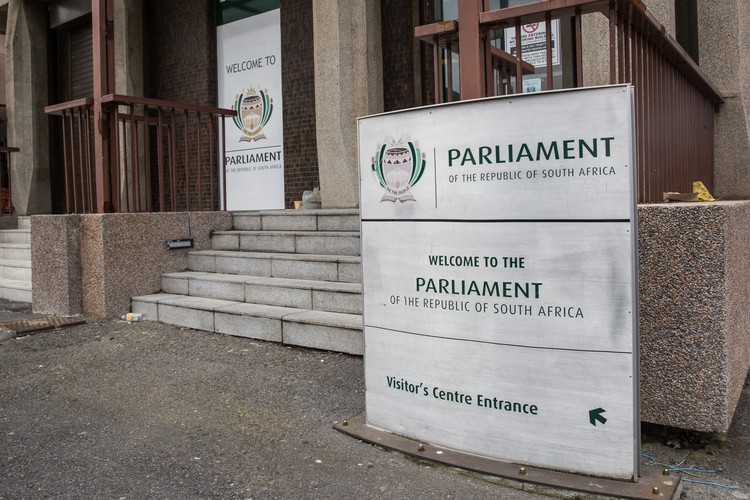New border control plan could harm asylum seekers, say critics
The One-Stop Border Post Bill aims to speed up trade and travel, but critics say protection for immigrants is inadequate
Parliament recently heard submissions on the One-Stop Border Post Bill. Archive photo: Ashraf Hendricks
- South Africa’s One-Stop Border Post Bill proposes joint border zones where officials from neighbouring countries conduct immigration, customs and security checks together to reduce delays and facilitate trade.
- Rights groups worry that asylum seekers could be “bounced” between officials from different states or face unlawful detention because the bill doesn’t clarify which country takes responsibility in these shared zones.
- Immigrant communities and trade unions support reducing border delays, but critics say the bill lacks anti-corruption mechanisms.
- They say it fails to address underlying policies that encourage irregular crossings and smuggling.
Asylum seekers could be “bounced” between countries at the border if South Africa’s One-Stop Border Post Bill is passed in its present form, says the Scalabrini Centre.
The bill proposes joint border zones where officials from South Africa and neighbouring states would conduct immigration, customs and security checks in one place. The government says this system would reduce delays and facilitate trade, as it has done elsewhere in Africa.
But some critics say the bill, in its current form, does not sufficiently protect immigrants, asylum seekers and refugees, and prioritises efficiency at the expense of human rights.
In a submission to Parliament’s Home Affairs Portfolio Committee, the Scalabrini Centre questioned how responsibilities would be handled in shared zones. Scalabrini said asylum seekers could be “bounced” through common control zones by officials from each state, or unlawfully detained and deported.
“This is particularly concerning given the different legal frameworks in place between many of our neighbouring states with regards to refugee protection,” the organisation warned in its submission, one of eight presented to the committee.
Scalabrini also flagged the absence of anti-corruption mechanisms in the bill, and the lack of references to constitutional rights or international human rights
Professor Loren Landau, co-director of the Wits-Oxford Mobility Governance Lab at the University of the Witwatersrand, said there was much in the Bill that was “sensible”, including commitments to improve trade and limit corruption.
“What is missing, of course, is how this articulates with policy frameworks that continue to incentivise corruption, irregular crossings, and smuggling. Until these are addressed there will be little practical significance apart from some extra tendering,” she said.
Landau said more effective management within Home Affairs, more resources for the asylum system and sanctions for employers who hired people without documents “could make a real and immediate difference”.
Professor Alan Hirsch, at the Nelson Mandela School of Public Governance at the University of Cape Town, said the Department of Home Affairs needed more funds for integrating systems and recruiting skilled and honest staff. “There are some funds budgeted for these purposes in the recent budget, but not as much as Home Affairs requested,” he said.
Lawyers for Human Rights (LHR) candidate attorney Nyeleti Baloyi told the committee that the bill would allow border officials to deny entry to, or remove, people based on the fact that they had entered through unofficial ports, even if they were asylum seekers entitled to protection under South African law.
LHR also warned against the arbitrary detention of immigrants. The organisation called for clear regulations, oversight, and compliance with international standards if any form of detention is allowed.
The Congress of South African Trade Unions (COSATU) said it broadly supported the bill’s trade objectives, but criticised Home Affairs for not consulting labour through NEDLAC. COSATU raised concerns that trade facilitation could be used to bypass customs duties, threatening local industries and jobs.
“We see an advantage in a One Stop Border Post in that it might create more efficiency and travellers might spend less time at the border post,” said Ngqabutho Nicholas Mabhena, chairperson of the Zimbabwe Community in South Africa. “We think it is a step in the right direction.”
Parliament’s committee is now reviewing submissions, and a revised version of the bill is expected later this year.
Support independent journalism
Donate using Payfast

Don't miss out on the latest news
We respect your privacy, and promise we won't spam you.
© 2025 GroundUp. This article is licensed under a Creative Commons Attribution-NoDerivatives 4.0 International License.
You may republish this article, so long as you credit the authors and GroundUp, and do not change the text. Please include a link back to the original article.
We put an invisible pixel in the article so that we can count traffic to republishers. All analytics tools are solely on our servers. We do not give our logs to any third party. Logs are deleted after two weeks. We do not use any IP address identifying information except to count regional traffic. We are solely interested in counting hits, not tracking users. If you republish, please do not delete the invisible pixel.

